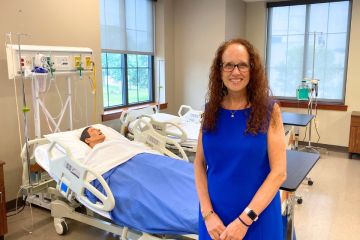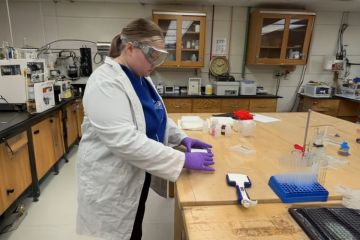From the Field to the Classroom

Tune in to NBC10 Philadelphia on Monday afternoons and chances are you’ll find reporter Tim Furlong live on the scene of one of the day’s big news stories.
But by 6:30 p.m., Furlong is in Widener’s state-of-the-art television studio teaching the next generation of journalists and media professionals how to polish their broadcast writing and production skills and perfect their on-camera presence.
Furlong’s instruction is regularly infused with examples from his on-the-job experiences of hours earlier, making his teaching not just real-life, but nearly real-time.
“I often talk about my experiences of that day – how it worked, what was the process,” he said. “It’s 100 percent real-world, happening-that-day kind-of-stuff.”
Furlong’s industry connections have also helped open the door for several of his communications studies students to intern or work at NBC10, launching their careers.
Amanda Lojewski ’18 landed a job there as a production assistant following graduation. Today she’s a reporter/multimedia journalist for WAOW News 9 in Wisconsin.
In class, Tim was so open to share his experiences so we can learn from him. He was literally doing what I wanted to be doing in my future. I could ask all the questions I had, build that friendship, and have that connection. Everything he taught me in class and outside of the classroom I use every day in my job. — Amanda Lojewski '18
Furlong is one of numerous Widener faculty – across the academic disciplines – who keep one foot in their fields and one foot in the classroom as they help prepare the next generation of professionals. This dual role offers Widener students invaluable real-world experiences and connections as they learn alongside professors who are also industry leaders.
Acute care nurse practitioner Mary Francis divides her time between a local hospital trauma department and Widener’s School of Nursing, where the assistant professor teaches pathopharmacology and medical-surgical courses.
Francis is a consummate teacher. Even in the hospital, she takes new nurses under her wings to help them transition to the job. And at Widener, “my students like my authenticity, the real-world cases I bring to class. They hear and see what I get to hear and see.”
Nursing major Cera Connelly ’19 says these real-world cases are more relatable and “aid the learning experience for us as students, making it simpler to understand and grasp difficult concepts that will help us succeed in clinical settings and on exams crucial to our acceleration in the program.”
By day, Dr. Mary Rourke is an associate professor of clinical psychology, teaching and advising Widener doctoral students. By night and weekend, she’s a practicing family therapist and co-founder and co-director of Dragonfly Psychological Associates, a thriving private practice.
Continuing clinical work keeps Rourke fresh in an ever-changing field, and offers her students the perspective of what it takes to run a private practice. The trends she observes in the clinical setting even help inform her students’ research topics.
“My teaching is stronger because I’m a clinician. And my practice is stronger because I’m a teacher. I learn so much in the classroom,” said Rourke. “They don’t feel like separate jobs to me.”
Rourke has actually chosen to integrate these two worlds in a more intentional way. Dragonfly routinely accepts Widener students for their practicum or post-doctoral work. In this way, Rourke’s students gain the field experiences they need for their careers, and she has a chance to further mentor and direct their training beyond the classroom setting.
And this pipeline has led many Widener graduates to Dragonfly full time. Today, 90 percent of the clinicians working there are alumni.
Among them is psychologist Lauren Perovich ’17, who specializes in helping children with ADHD. At Dragonfly, she also supervises a current Widener practicum student, and is back at the university to teach part-time.
“The Widener faculty, and Mary specifically, takes this really important developmental perspective in the training of clinicians. I definitely felt that and it’s fostered me and helped me grow,” said Perovich. “Now I’m reflecting on that experience to help the next generation.”



